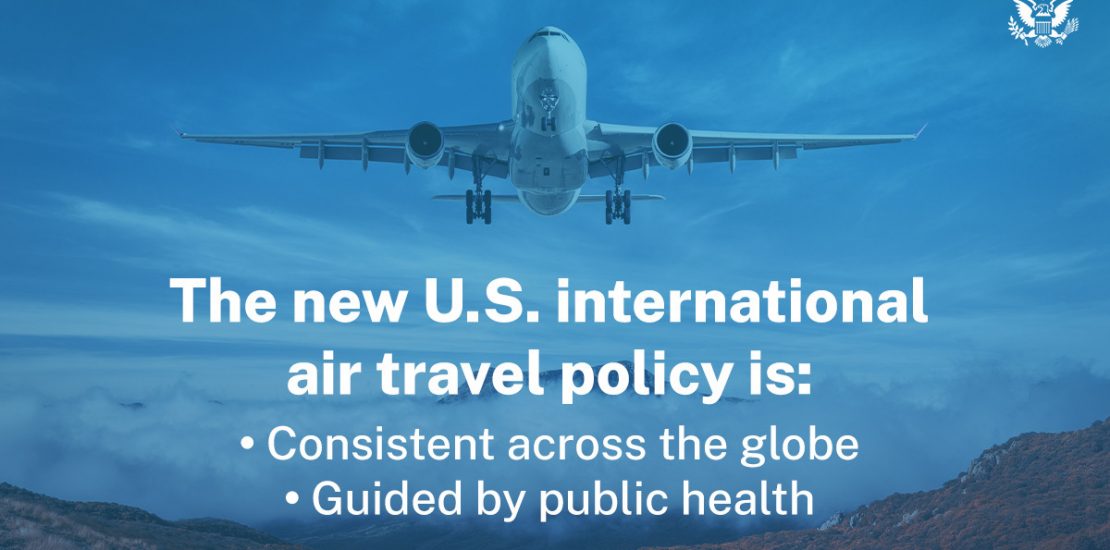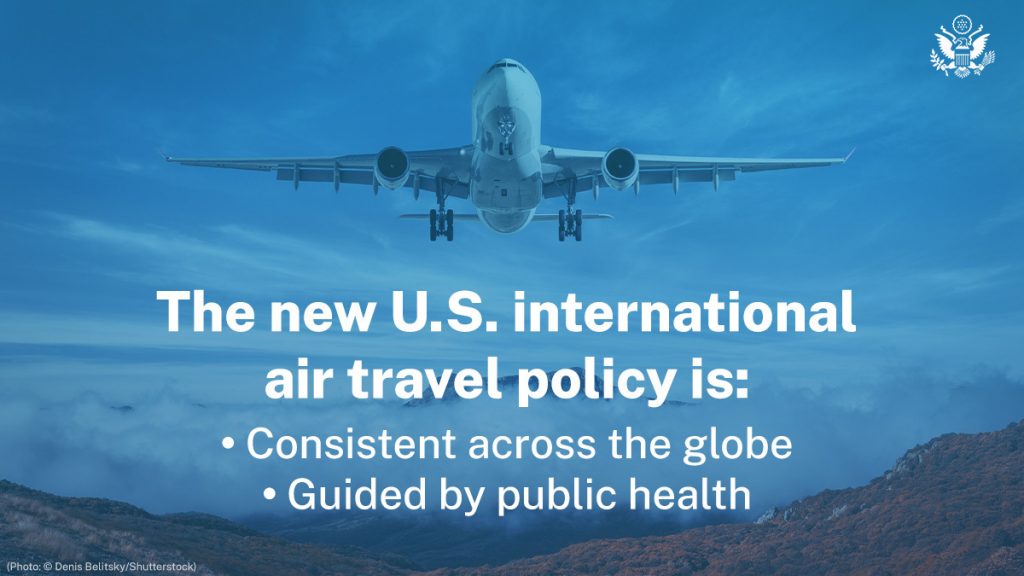- October 28, 2021
- Posted by: admin
- Category: Latest News, Marine & Aviation, Tourism


Frequently Asked Questions on COVID-19 Vaccinations and Testing for International Travel
The Biden Administration announced a new international air travel policy that is stringent, consistent across the globe, and guided by public health.
Starting on November 8, foreign national air travelers to the United States will be required to be fully vaccinated and to provide proof of vaccination status prior to boarding an airplane to fly to the United States, with only limited exceptions.
The CDC has determined that for the purposes of entry into the United States, vaccines accepted will include those FDA approved or authorized, as well as vaccines with an emergency use listing (EUL) from the World Health Organization (WHO). See the CDC’s website for more details.
Fully vaccinated air travelers will continue to be required to show documentation of a pre-departure negative viral test from a sample taken within three days of travel to the United States before boarding. That includes all travelers – U.S. citizens, lawful permanent residents (LPRs), and foreign nationals.
To further strengthen protections, unvaccinated travelers – whether U.S. citizens, LPRs, or the small number of excepted unvaccinated foreign nationals – will now need to show documentation of a negative viral test from a sample taken within one day of travel to the United States.
What should passengers provide to airlines to show they are fully vaccinated?
Both U.S. citizens and foreign nationals who are fully vaccinated should travel with proof of their vaccination status to provide to their airline prior to departure to the United States.
That proof of vaccination should be a paper or digital record issued by an official source and should include the traveler’s name and date of birth, as well as the vaccine product and date(s) of administration for all doses the traveler received.
Who will need to present their vaccination status to airlines?
For foreign nationals, proof of vaccination will be required – with very limited exceptions – prior to departure to the United States.
While vaccination proof is not required for U.S. citizens and LPRs, fully vaccinated U.S. citizens and LPRs (and their dependents) will continue to be able to show documentation of a negative viral test from a sample taken up to three days before departure to the United States. They must present proof of vaccination to qualify for the 3-day test window. U.S. citizens and LPRs who are unable to show that they are fully vaccinated will have to show documentation of a negative viral test taken no more than one day before departure.
How will the vaccination status of travelers be verified by airlines?
In addition to verifying proof of a pre-departure negative test result – which they have done since January 2021 – airlines will now also verify vaccination status.
Passengers will need to show their vaccination status, either via a paper record, a photo of their paper record, or a digital app.
The airlines will need to:
o Match the name and date of birth to confirm the passenger is the same person reflected on the proof of vaccination;
o Determine that the record was issued by an official source (e.g., public health agency, government agency) in the country where the vaccine was given;
o Review the essential information for determining if the passenger meets CDC’s definition for fully vaccinated such as vaccine product, number of vaccine doses received, date(s) of administration, site (e.g., vaccination clinic, healthcare facility) of vaccination.
Which vaccines will be accepted?
CDC has determined that for purposes of travel to the United States, vaccines accepted will include FDA approved or authorized and World Health Organization (WHO) emergency use listed (EUL) vaccines. See the CDC’s website for more information.
How does the exemption from full vaccination for children work?
Children under 18 are exempted from the vaccination requirement for foreign national travelers, given both the ineligibility of some younger children for vaccination, as well as the global variability in access to vaccination for older children who are eligible to be vaccinated.
What are the testing requirements for children?
Children between the ages of 2 and 17 are required to take a pre-departure test.
If a child is not fully vaccinated and traveling with a fully vaccinated adult, they can show proof of a negative viral test from a sample taken within three days before departure (consistent with the timeline for fully vaccinated adults).
If an unvaccinated child is traveling alone or with unvaccinated adults, they will have to show proof of a negative viral test from a sample taken within one day of departure.
While children under 2 years of age are excepted from the testing requirement, CDC recommends a pre-departure test for these children whenever possible.
What kinds of tests meet the testing requirement?
Travelers must show documentation of a negative viral COVID-19 test result or documentation of recovery from COVID-19 within the past 90 days before boarding a plane to the United States (or before boarding the first flight in a series of connections booked on the same itinerary to the United States).
Both nucleic acid amplification tests (NAATs), such as a PCR test, and antigen tests qualify.
A self-test can be used if it meets the requirements of the order including real-time proctoring by a telehealth service affiliated with the manufacturer of the test and that generates a test result that can be reviewed by the airline before boarding.
This is the same standard for qualifying tests that has applied to the pre-departure testing requirement since January.
More information on the types of viral tests is available here.
What does it mean to test “3 days before departure”?
The test must be administered no more than three calendar days before the date of the international flight to the United States.
So, if a traveler is departing for the United States at 10 PM on January 19, they would have to present a negative test result for a test that was taken any time after 12:01 AM on January 16.
What are the changes for U.S. citizens in this new international travel system?
Previously, all travelers were required to show a negative test result within three days of travel to the United States.
For those U.S. citizens and LPRs who can show they are fully vaccinated, that requirement remains the same – they have to show documentation of a negative test result from a sample taken within three days of travel.
That means that all fully vaccinated U.S. citizens and LPRs traveling to the United States should be prepared to present documentation of their vaccination status alongside their negative test result.
Those U.S. citizens and LPRs who cannot demonstrate proof of full vaccination will now have to show documentation of a negative test from a sample taken within one day of departure.
What happens if someone cannot find a test that delivers a result within 1 day?
The easiest way to avoid having to meet this tougher requirement is for travelers to get vaccinated.
We believe the overwhelming majority of international travelers will already be fully vaccinated and those who aren’t already and are eligible should get vaccinated before traveling.
Over-the-counter proctored tests are widely available in the United States, so U.S. citizens traveling abroad can bring a proctored test kit with them upon departure from the U.S. that they can take before returning home. And we are confident that there will be sufficient supply globally as well.
However, there is also a waiver process in place from the pre-departure testing requirement when a suitable test is not available.
What does November 8 mean – when is the first time a flight can take off under the new system?
This will be effective for passengers on planes that depart from their foreign destination at or after 12:01 AM Eastern Time on November 8.
Will the previously announced changes to travel restrictions at the land border also occur on November 8? When will we have more details?
See cbp.gov for further details on land borders.
What does November 8 mean for the land border? Is that also 12:01 AM ET? Or 12:01 AM local time? Or some other time?
See www.cbp.gov for further details on land borders.
What happens to the current restrictions for the 33 countries currently subject to broad prohibitions on travel to the United States?
This new global travel system replaces the existing country-by-country restrictions, putting in place a consistent approach worldwide.
How is the United States government determining exceptions to the vaccination requirement for foreign nationals?
The presidential proclamation and CDC order include a very limited set of exceptions from the vaccination requirement for foreign nationals.
These include exceptions for children, certain COVID-19 vaccine clinical trial participants, those with rare medical contraindications to the vaccines, those who need to travel for emergency or humanitarian reasons, those who are traveling on non-tourist visas from countries with low-vaccine availability, members of the armed forces and their immediate families, airline crew, ship crew, and diplomats.
What does the new contact tracing order do?
The new contact tracing order will be critical to detect and respond to variants of COVID-19, as well as to address other public health threats, making us better prepared.
The Order requires that airlines collect contact information for all international inbound travelers to the United States – including full name, as well as a phone number, email, and address at which they can be reached while staying in the United States.
Airlines will have to keep this information on hand and promptly turn it over to the CDC when requested.
What if a passenger provides a fake test result or vaccination card?
For each of these requirements, air passengers will have to sign an attestation, certifying the validity of vaccination and testing, and confirming that their contact information is complete and accurate.
Falsifying any information could result in criminal penalties and/or fines.
Why are immigrants not covered by the new proclamation or orders?
Immigrants are already subject to separate requirements for medical examination and vaccination.
How will the limited vaccine availability exception work?
Please see the CDC website for more information on exceptions.
How will the humanitarian or emergency exception work?
Please see the CDC website for more information on exceptions.
How will the medical contraindication exception work?
Please see the CDC website for more information on exceptions.
Which clinical trials will qualify for someone to be excepted from the full vaccination requirement?
Please see the CDC website for more information on exceptions.
